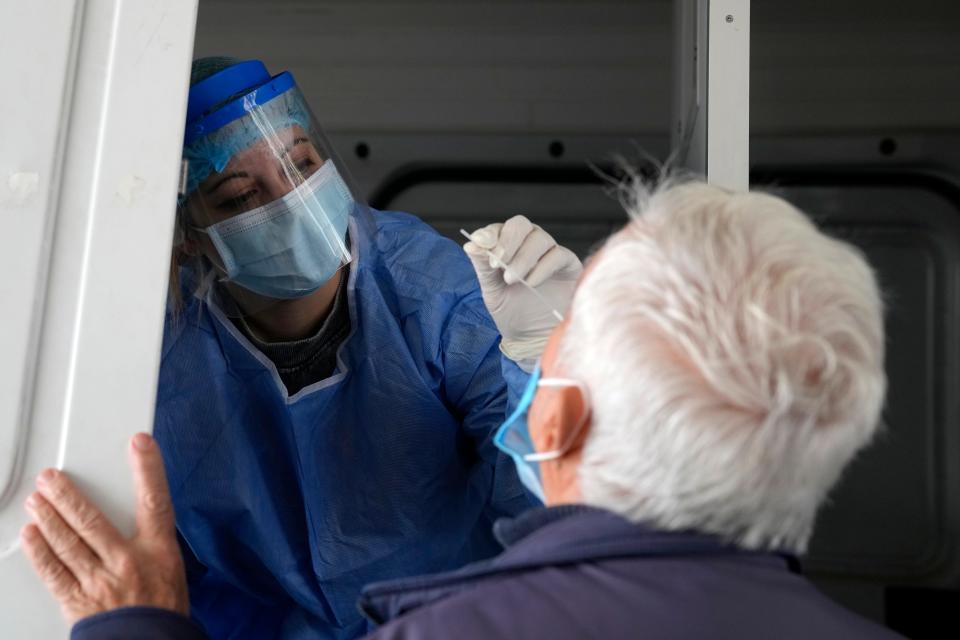Omicron, the newest coronavirus variant: How to pronounce it, how it got its Greek name, and what it means
Public health officials in recent days have raised alarms over a new variant of the coronavirus that could fuel a global surge of COVID-19 cases with "severe consequences," the World Health Organization says.
Named after the Greek letter, the omicron variant is the 13th variant of the SARS-CoV-2 virus that has received a Greek designation under the World Health Organization's classification system for variants of interest or concern.
As with other named variants, WHO's Technical Advisory Group on Virus Evolution said the variant rose to the level of concern given its "several mutations that may have an impact on how it behaves, for example, on how easily it spreads or the severity of illness it causes."
Several others, such as delta, which caused the United States' spike in cases over the summer, remain listed as variants of concern or interest and also have Greek letter names, while others have dropped off and are now labeled "variants under monitoring" or "formerly monitored variants."
How omicron variant got its name
When variants first became a wider concern for the general public, many people were referring to them by the name of the country where they were first detected, such as the "U.K. variant." But that's "not the right way of thinking about it," said Dr. Waleed Javaid, a professor of infectious diseases and medicine and director of infection control at Mount Sinai hospitals in New York.
"The virus is going to spread as the virus does. It is infectious and it infects other people. And it's not really based on a location. It is based on its infectivity," he told USA TODAY.
In May, WHO announced it would use a new system for naming variants to avoid confusion and stigmas to countries where the variants are first documented.
Omicron's scientific name under the Pango system, from the Phylogenetic Assignment of Named Global Outbreak group, is B.1.1.529, which conveys scientific information about its lineage.
Why we're using the Greek alphabet: WHO renames COVID-19 variants with Greek letter names to avoid confusion, stigma
WHO said the goal of using the Greek alphabet is to make it easier and more practical for nonscientific communities to discuss the variants. Javaid said he has found using the Greek letters is helpful when communicating with patients or staff members who are not trained in understanding the technical aspects of the variants' differences.
Calling variants by the names of countries may also create unfair stigmas when the variants may not have originated in those countries and were only first detected there.
South Africa reported the first case of the omicron variant to WHO on Nov. 24. Its first known infection was from samples collected Nov. 9, but Botswana also had samples collected Nov. 11 with the variant present. WHO lists "multiple countries" for its earliest documented samples as a result.
How to pronounce omicron
Omicron can be pronounced both ä-mə-ˌkrän or ō-ˈmī-(ˌ)krän, according to Merriam-Webster.

How many coronavirus variants are there?
Though scores of variants are popping up and circulating around the globe every day, only a dozen before omicron have risen to the level of concern or interest. It is impossible to know the total number of all variants, however, said Javaid.
To be a labeled a "variant of concern," the variant must be associated with an "increase in transmissibility or detrimental change in COVID-19 epidemiology, or increase in virulence or change in clinical disease presentation, or decrease in effectiveness of public health and social measures or available diagnostics, vaccines, therapeutics," according to WHO.
More on omicron: What to know about omicron, the new COVID-19 variant in South Africa
A "variant of interest" is associated "with genetic changes that are predicted or known to affect virus characteristics such as transmissibility, disease severity, immune escape, diagnostic or therapeutic escape and identified to cause significant community transmission or multiple COVID-19 clusters, in multiple countries with increasing relative prevalence alongside increasing number of cases over time, or other apparent epidemiological impacts to suggest an emerging risk to global public health," WHO says.
There are now five named variants of concern: alpha, beta, gamma, delta and omicron. There are two variants of interest, lambda and mu.
Kappa, iota and eta are three former variants of interest now classified as variants under monitoring, and epsilon, zeta and theta are now formerly monitored variants.
"Variants under monitoring" are have "genetic changes that are suspected to affect virus characteristics with some indication that it may pose a future risk, but evidence of phenotypic or epidemiological impact is currently unclear, requiring enhanced monitoring and repeat assessment pending new evidence," WHO says.
"Formerly monitored variants" meet one of the follow criteria, WHO says: "(1) the variant is no longer circulating at levels of global public health significance, (2) the variant has been circulating for a long time without any impact on the overall epidemiological situation, or (3) scientific evidence demonstrates that the variant is not associated with any concerning properties."
What does omicron mean in Greek?
Omicron is the 15th letter in the Greek alphabet. It uses the uppercase "Ο" and lowercase "ο" symbols.
According to the Merriam-Webster dictionary, its literal translation in Greek means "small o."
What happened to the nu and xi variants?
WHO said it passed over "nu" to avoid confusion and "xi" given its commonality.
"'Nu' is too easily confounded with 'new,' and 'Xi' was not used because it is a common last name," WHO added in a statement. Its best practices for naming disease suggest avoiding causing offense to "cultural, social, national, regional, professional or ethnic groups."
Contributing: Elizabeth Weise, USA TODAY; The Associated Press
This article originally appeared on USA TODAY: Omicron coronavirus variant: How it got its name, how to pronounce it

